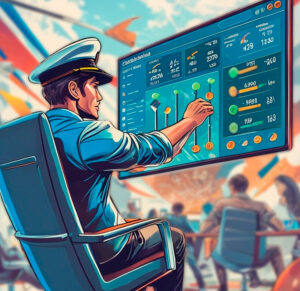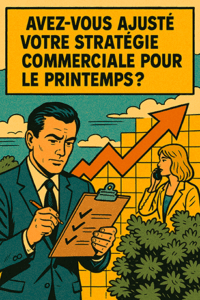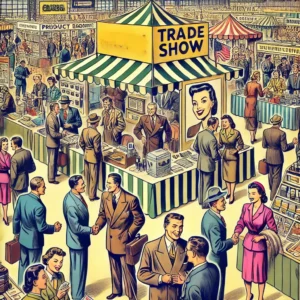
Adaptive Leadership in Hybrid Organizations
The adaptive leader, like a chameleon, adjusts in real time to effectively orchestrate a hybrid and connected team.
By Jean-Charles Spanelis – August 28, 2023
Updated by Nadia Bulcourt – April 4, 2024
In today’s business world, the importance of customer relations cannot be overstated. It represents the fundamental pillar on which a company’s success rests. Beyond simple business transactions, customer relations encompass a complex set of interactions, strategies and commitments aimed at building customer loyalty and satisfaction.
Effective management of this relationship requires a methodical, well-orchestrated approach, often facilitated using technological tools such as CRM (Customer Relationship Management). These specialized software programs centralize customer information, track interactions and coordinate sales efforts more effectively.
However, beyond the use of a CRM, it is the competence and performance of sales teams that are the real engine of growth for a company. Salespeople, under the enlightened guidance of sales directors and sales managers, are the architects of this customer relationship, deploying expert prospecting, loyalty, and sales strategies.
To address this topic, Elisabeth Beauregard and Jean-Charles Spanelis, CEO of Finelis, explore in depth the importance of customer relationship assessment. So, is CRM a super-powerful tool… or not?
I think everyone is familiar with CRM. It’s that famous database of customer and prospect contacts. Today, I’d like to start a little debate, because everyone has been talking about CRM for quite a few years now. It’s a very powerful tool, potentially.
https://www.finelis.com/why-should-your-company-use-a-crm/
Now, for some companies, this tool can also be very time-consuming. So, what we’re going to do with Elisabeth is to draw up a portrait of the ideal CRM, to see what mistakes to avoid and what a good CRM is for, which is useful to everyone.
What is your experience, Elisabeth, with CRM? Has it helped or hindered you? How do you see things in relation to CRM?
As far as I’m concerned, CRM was a life-changing experience when I worked in the events industry, and we started using this tool. Before CRM came along, we used to draw up schedules with pencils and Excel files. So, with CRM it was a bit like driving a Ferrari.
What’s more, CRM was new. We were contributors to its continuous improvement, and consequently, we were able to push features that were useful to us. It was very useful.
But then, it’s true that the tool became a big machine over time. You fill in some data and then it becomes obsolete. Then you forget to clean it up, and it gets weighed down. You add criteria and they become unreadable over time.
So, when you set up a CRM, you need to think carefully about what it will become the next day.
“Having a CRM is good. Knowing how to evaluate the quality of your relationship with prospects who could potentially be converted into customers is better.”
What do you want to achieve with CRM? Who will it be used for? It’s up to the user to configure it for optimum performance, not the IT manager. In addition, you need a reference person, an administrator within the organization, to oversee the life and coordination of this CRM, including its upgrades.
Should the CRM administrator be the sales manager who manages his team? And as soon as he encounters minor technical problems, he can ask the IT team to help him. I think that the sales manager or sales staff should be the driving force behind this solution and its administrators.
In any case, they should be people who use the solution a lot. Either salespeople, or the marketing team, it depends on the structure. Next, this administrator must communicate with his or her team. It’s essential that there be regular project coordination. It must stay in touch with all the users to avoid any possible blockage.
In my experience, sales and marketing teams tend to use CRM in a collaborative way. They all contribute to it. And even if sales and marketing managers are happy with the reporting, it’s already a big challenge.
So should other teams have access too?
If a question concerns departments like accounting or logistics, then access for these departments is useful. But these would be one-off inputs or visualizations, not a permanent mobilization of these teams.
With regard to your experience in this field, do you think that CRM tools are well used, and do you notice that salespeople are rather happy with their use, or are you disappointed with the tool?
I find that there is a lot of dissatisfaction for many reasons.
It’s important to understand that behind the CRM idea are the customers. In fact, the tool is there to serve the customer. It helps us to record and have the right data to enhance the quality of the customer relationship. It’s not just for salespeople. CRM needs to be configured to the customer’s expectations.
CRM is a solution that must serve the prospect, the customer. Of course, it is also useful for the salesperson, the user, with the aim of improving customer relations.
It must enable:
To achieve this, regular training sessions must be organized. But it’s true that, in the beginning, you’ll have to accept that you’ll have to spend some time on it. You’ll earn it back later.
An example: sending emails with your CRM. Even today, in 2023, there are so many different technologies and CRMs that we forget the basics. And most people I know don’t send emails with their CRM. And I’m talking about a micro-feature.
What’s more, we all sometimes find it hard to share information. That’s what’s behind CRM too. It’s often easier to go to your mailbox. But if you use a CRM, you can find all the e-mails you’ve sent with just one click.
Sometimes, it’s not a question of not wanting to share information, but rather a fear on the part of certain employees. And when a sales rep wants to access the work of his colleague based in the USA, he is confronted with locked access. The manager has locked access for a variety of reasons, so he must ask his superiors for authorization. This creates complexity and recurring problems.
A CRM is very useful, but it will depend on each company, its context and the personalities of the people who work there too. Its use will also depend on the company’s resources, and the time required for structuring and training.
It’s a cost, and it must be worth it. And as we said earlier, it depends on the objectives. You must set yourself a few criteria and indicators. You must be able to measure the effectiveness of your time and financial investment.
Teams, managers, and salespeople need to talk to each other about CRM. That’s what usually happens in regular sales sessions. I think what’s a bit lacking self-assessment in relation to the collaborative aspect is we were talking about.
If there’s a good collective spirit and everyone’s moving in the right direction, then CRM is more effective for companies of all sizes, small, medium, and large. It’s a collaborative tool that needs to be chosen and decided first and foremost by sales management, salespeople, marketers and all the people in other departments who are going to work with these different teams and with salespeople to communicate, to collaborate.
It’s also very important for product people to have access to CRM, and for salespeople to be able to exchange information directly via CRM.
I encourage all professionals to upgrade their current CRM and really move forward. It’s a real project and I think it’s interesting. It can mobilize teams and create a bit of cohesion between them.
Taking advantage of a new development or the installation of new software or processes to work together and help each other is also an opportunity that companies tend to forget.
For our part, what we’re currently doing in-house is offering our customers everything to do with scoring, evaluation and relationship scoring. Since Covid, all companies have realized that there are far more videoconferences than face-to-face meetings. But in their commercial database, they all have a rather interesting history from the years before the pandemic.
And it’s interesting to be able to assess the level of relationship you have with your prospects, customers, and suppliers. Today, all the studies show that people are tending to refocus on their local network, because 2023 is a difficult year in economic terms. And networks also need to be evaluated.
In any case, I encourage everyone to work on these issues, because I think that today we really need to focus on quality, at least in terms of customer relations.
Don’t hesitate to come back to us if you’d like to share your experience of one or more CRMs, and we can discuss it with Elisabeth and myself.

The adaptive leader, like a chameleon, adjusts in real time to effectively orchestrate a hybrid and connected team.

Looking for commercial results without the recruitment delay? Discover how a fractional Sales Director can hit the ground running and drive performance from day one.

Spring is a turning point in your business dynamics. Take stock of your commitments, realign your teams, and boost your results before summer.

Feeling the winter drag on your team? Reignite connection, clean your tools, and give your people purpose with 3 actionable ideas from Finelis.

Spring is a strategic time to boost your business. Discover how to align your sales efforts with seasonal cycles and turn the transition into a growth driver.

Attending a trade show is a powerful business opportunity. Discover how to maximize your impact with strong preparation, engaging techniques, and structured follow-ups.